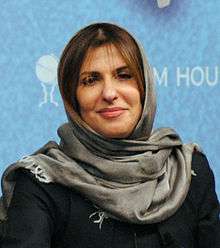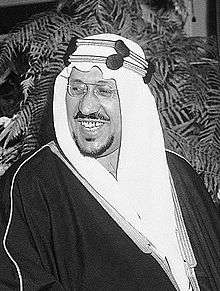Basmah bint Saud Al Saud
| Basmah bint Saud Al Saud | |||||
|---|---|---|---|---|---|
 Basmah bint Saud at Chatham House in 2013 | |||||
| Born |
1 March 1964 Riyadh, Saudi Arabia | ||||
| Issue |
Saud Sara Samahir Soohod Ahmad | ||||
| |||||
| House | House of Saud | ||||
| Father | King Saud | ||||
| Mother | Jamila Merhi | ||||
| Religion | Wahhabi Hanbali Sunni Islam | ||||
Basmah bint Saud bin Abdulaziz Al Saud (Arabic: بسمة بنت سعود بن عبد العزيز آل سعود; born 1 March 1964) is a Saudi businesswoman and a member of House of Saud. Part of her childhood was spent in Beirut, Lebanon. As a result of the Lebanese Civil War, she and her mother, Princess Jamila bint Asad Ibrahim Marei, moved between London and the United States.[1] Princess Basmah is known for introducing the Fourth Way Law.
Princess Basmah is the youngest child of her father King Saud. Her mother Princess Jamila emigrated to Saudi Arabia from the Syrian port city of Latakia and studied under Abdulaziz. She married Abdulaziz's son and successor King Saud, with whom she had seven children.[1]
Early life

Born on 1 March 1964 in Riyadh, Saudi Arabia,[1] Basmah is the 115th and youngest of King Saud's children.[2][3] Her mother was a Syrian-born woman, Jamila Merhi,[1] who was chosen for her future husband when she visited Mecca on the hajj.[2]
Basmah was born during the final months of her father's reign, the same month he was overthrown as a real ruler in a palace coup. She saw him only twice when she was five[4], the year of his death. Her mother took her to the Middle East's then-most cosmopolitan city, the Lebanese capital of Beirut. When Lebanon's civil war broke out in 1975, the family fled for Britain.[1][2]
Education
In Beirut, Basmah bint Saud attended a French school. In Britain, she attended a Hertfordshire girls' school and a College in London, before spending two years studying in Switzerland.[2] Basmah studied medicine, psychology and English literature at Beirut Arab University.[1] In 1979, she graduated from high school at the Leaders College in America.
Basmah travelled between several European capital cities and the US, where she studied at various universities, before moving with her mother to Syria in 1983. These universities included Richmond in the UK the American University in Lausanne, Switzerland, where she studied the social sciences. In 1984, she received BSc (Hons) Degree in Sociology from the National American University, then in 1986, went on to achieve MSc Degree in Social Economics and Political Science.
Personal life
Princess Basmah was married to a member of the Al Sharif family in 1988.[1] They divorced in 2007.[1] She is a mother of five children.[2] Her children, three daughters and two sons, are Saud, Sara, Samahir, Sohood and Ahmad.[5]
Blackmailed
Princess Basmah said that a gang blackmailed her to transfer £320,000 to a bank account in Egypt. The threat was a to publish visual materials showing her smoking and blowing a kiss in front of a PC camera without a veil on her head. Basmah said that the material was stolen from her personal PC. However, she published the recording of a conversation between her and the blackmailer on her YouTube official website.[6] She said in Saudi Arabia it is inappropriate that women appear without a hijab or smoking in public.[7]
Business
After Basmah bint Saud divorced her Saudi husband, she founded a chain of restaurants in Saudi Arabia and she is planning to expand these into Britain.[2] In 2008, she also founded a media firm, Media Ecco, in addition to catering firms, which she is also planning to expand.[1]
Views
Basmah bint Saud is a mild advocate of reform. She has been an active participant of different social institutions and human rights organizations. She began to express her views on Arab and international media, writing articles on the hard life conditions of Saudis, particularly of women.[8] However, her criticisms do not directly address the royal family but the Saudi governors and other middle-level administrators.[2][8] Writing for Al Madina newspaper in April 2010, Basmah bint Saud told that she could not find any Qur'anic or Islamic historical basis for a state institution to promote virtue and prevent vice, and she further argued that the arrests and beatings by religious policemen lead to an incorrect impression about Islam.[9] She specifically supports reform in Saudi Islamic laws regarding bans on mixed gatherings of men and women, and to make optional for Muslim women to cover modestly or not.[2]
Her journalism and blogging has drawn criticism, and she told The Independent that Saudi officials had begun censoring her articles.[2] On the other hand, she insisted that her move from Jeddah to Acton was not due to pressure from the Saudi state.[10] Basmah bint Saud has questioned the misuse of the Islamic fiqh in Saudi society, arguing that the religious establishment needs to be reformed in order that it plays a constructive role in modernising society and improving the situation of women in the kingdom.[11]
In April 2012, Basmah told BBC that there are many changes she would like to see in Saudi Arabia but that is not the time for women to be allowed to drive,[12] a right Saudi women were given as part of the reforms by King Salman and Crown Prince Mohammad bin Salman.[13] Basmah called for changes concerning constitution, divorce laws, overhaul of the educational system, complete reform of social services and changes in the role of the mahram (the male guardian, usually a relative, that all Saudi women are required to have).[12] Upon the paralysing of a Saudi national as a punishment by the Kingdom, Princess Basmah criticised it, stating that it cannot be acceptable on humanitarian grounds.[14]
The Fourth Way Law
Through the research centre, GURA, based in London, the Fourth Way Law was registered and documented by the European Union in 2014. Princess Basmah received a prize in recognition for internationally monitoring human rights, geopolitical changes, international developments, establishing training centres in various fields related to the culture of the Fourth Way Law on a global scale, such as security, economic and administrative. It has been noted that many countries, such as America and Britain, have been taking recommendations from the Fourth Way Law when making decisions on intellectual, environmental and economic security which other specialist international research centres had not discussed.
One of these recommendations was the decision of the American President Obama in 2014 to implement a law to monitor social network sites and develop specialised laws for it. This idea was raised when Princess Basmah suggested it at the research centre at the University of Yale in New York in 2011. Heads of the boards of directors from Google, Yahoo and Microsoft had attended her lecture.
Many sections from the Fourth Way Law[15] specialising in human rights have also been adopted in Britain after she gave a famous lecture at the University of Cambridge in 2012.[16] In July 2015, the British government took up all the recommendations offered by Princess Basmah in the Fourth Way Law during her residence in Britain (2011–2014).[17]
References
- 1 2 3 4 5 6 7 8 9 "Biography". Basmah bint Saud. Archived from the original on 1 May 2015. Retrieved 15 May 2012.
- 1 2 3 4 5 6 7 8 9 Milmo, Cahal (3 January 2012). "The Acton princess calling for reform in Saudi Arabia". The Independent. Retrieved 5 April 2012.
- ↑ "Meet Princess Basma, the 115th child of King Saud". Malaysia Chronicle. 15 October 2012. Retrieved 17 February 2013.
- ↑ Mendick, Robert (17 February 2013). "The Saudi princess, the fake sheikh and a plot to silence her". The Telegraph. Retrieved 17 February 2013.
- ↑ "King Saud's Sons and Daughters". King Saud.net. Retrieved 23 June 2012.
- ↑ "Saudi princess blackmailed by a fake sheikh who wants £320,000 for video which shows her smoking and blowing a kiss with head uncovered". Daily Mail. 17 February 2013. Retrieved 28 April 2013.
- ↑ "The Saudi princess, the fake sheikh and a plot to silence her". The Telegraph. 17 February 2013. Retrieved 28 April 2013.
- 1 2 Admon, Y. (4 April 2012). "First Signs of Protest by Sunnis in Saudi Arabia" (Inquiry and Analysis Series Report No.819). MEMRI. Retrieved 27 May 2012.
- ↑ "Saudi Arabia. Looser Rein, Uncertain Gain" (PDF). Human Rights Watch. 2010. Retrieved 20 April 2012.
- ↑ "Princess Basma bint Saud bin Abdulaziz leads campaign of Saudi dissent". Acton w3. 3 January 2012. Retrieved 6 April 2012.
- ↑ "Princess Basma bint Saud Fredom". Memri. 7 July 2011. Retrieved 6 April 2012.
- 1 2 "Saudi princess: What I'd change about my country". BBC. 8 April 2012. Retrieved 18 April 2012.
- ↑ "Saudi Women Can Drive, but Here's the Real Roadblock". New York Times. 22 June 2018. Retrieved 22 June 2018.
- ↑ "Princess condemns Saudi Arabia paralysis sentence". BBC. 5 April 2013. Retrieved 5 April 2013.
- ↑ http://thefourthwaylaw.com
- ↑ https://cus.org/media/1987
- ↑ http://www.alriyadh.com/1143979
External links
- Official website
- Template:Official twitter